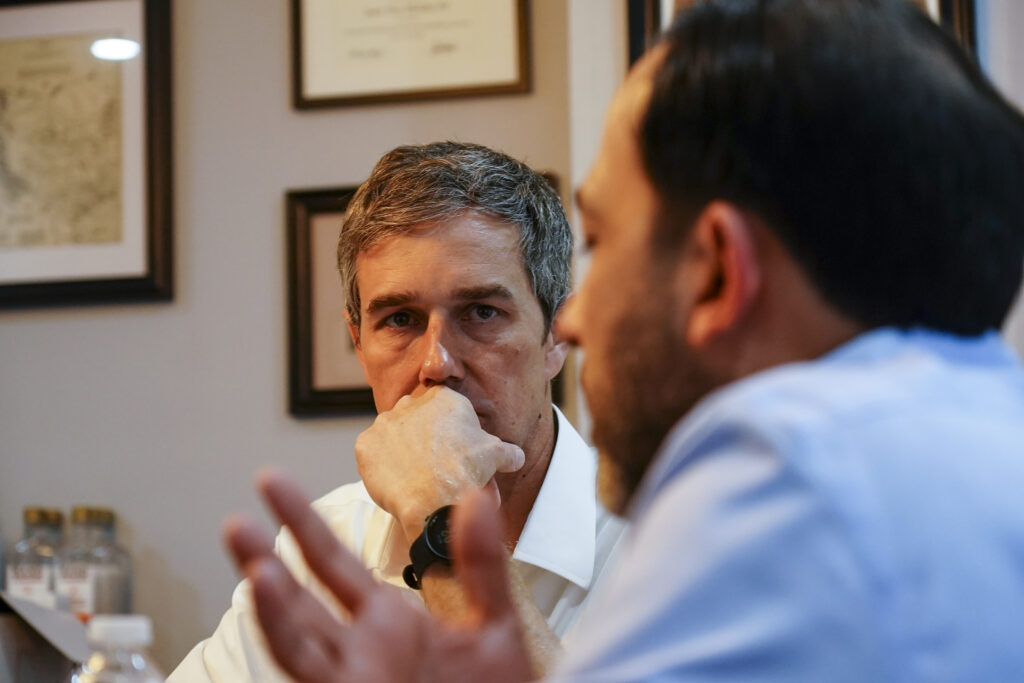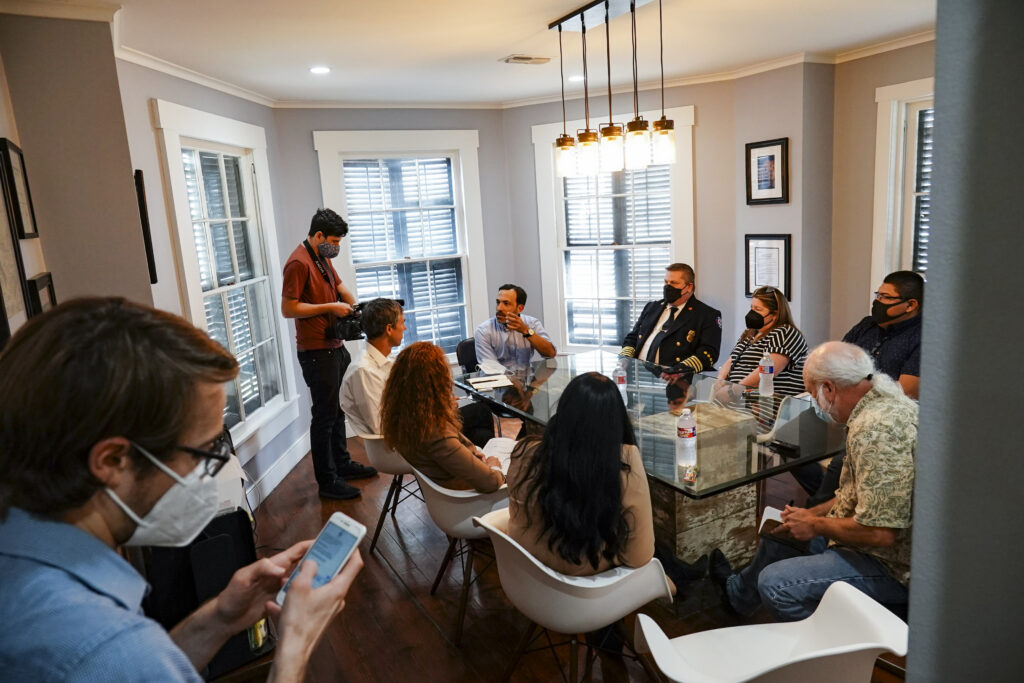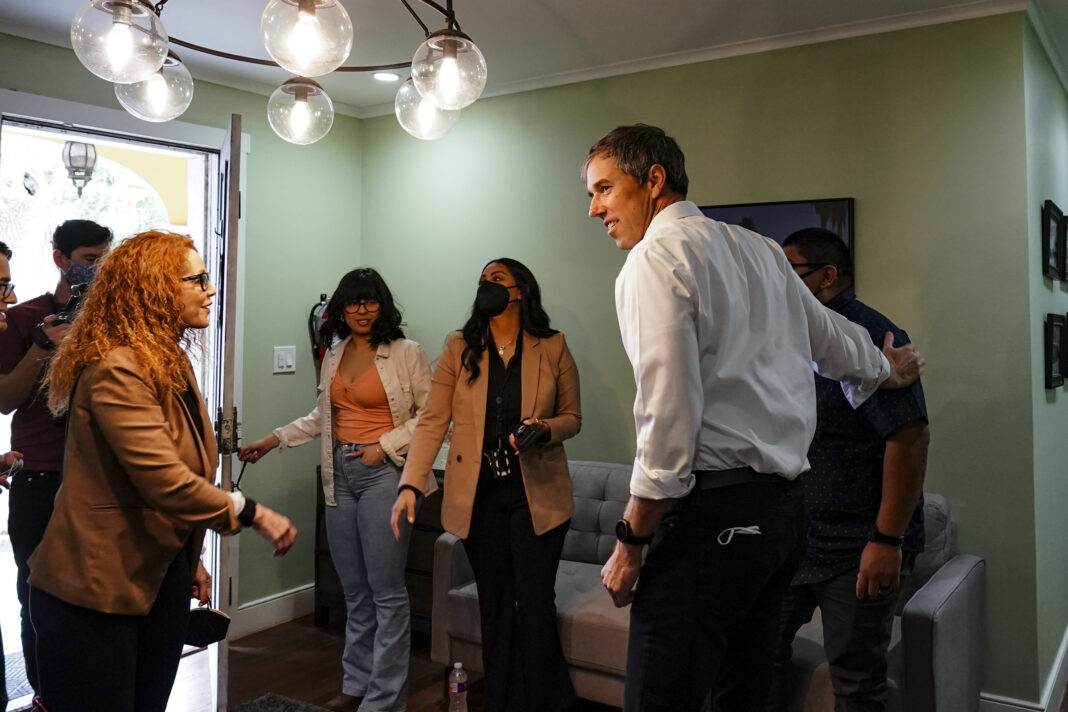Texas Democratic candidate for governor Beto O’Rourke stopped in Brownsville on Friday for a listening session with Mayor Trey Mendez, City Manager Noel Bernal, Fire Chief Jarrett Sheldon, Emergency Operations Center Director Odee Ann Leal and others at Mendez’s law office.

It was part of O’Rourke’s statewide “Keeping the Lights on Tour,” a reference to the electrical grid failure during last February’s devastating winter storm and the fact that not enough has to be done to avoid a repeat, at least according to U.S. energy regulators and industry experts. The El Paso native, who was here in November, is using the issue as a cudgel against Republican Gov. Greg Abbott during the campaign.
O’Rourke said he was interested in how the city managed through the extreme weather event and subsequent blackouts, but also wanted to hear about city initiatives such as a planned micro-grid project (to ensure power if the rest of the grid goes down again) and the expansion of broadband internet access to Brownsville residents, plus steps the city has taken to prevent bottlenecks of migrants and asylum seekers.
He noted that natural gas companies made $11 billion in profits over five days during the February 2021 storm, a figure San Antonio Mayor Ron Nirenberg has described as the “most massive wealth transfer in Texas history.” O’Rourke characterized it as “illegal windfall profit” running counter to the Texas Deceptive Trade Practices Consumer Protection Act.
Brownsville Public Utilities Board experienced a storm-related $35 million shortfall, which would have been “well over $100 million” if not for BPUB’s local generating capacity, Mendez said. BPUB ratepayers will cover the shortfall over the next 10 to 20 years even though the grid failure wasn’t their fault, he said.
“We had an entire state legislative session that just happened and we didn’t see any sort of regulation or resolution to that,” Mendez said. “Gas companies can still charge what they want to charge in the face of an emergency.”

Utility customers in some cities are paying an average of $20 to $50 more a month for electricity due to shortfalls, O’Rourke said.
“Imagine if you got that $11 billion back and reimbursed municipal-owned utilities like Brownsville and San Antonio,” he said. “It’s just not right that folks who did nothing to cause the problem have to pay to clean it up, and people who had control of the gas supply were able to make crazy profits.”
O’Rourke said it’s important to be “clear-eyed about the consequences of what happened last year” as well as what has to happen to make sure it doesn’t happen again. According to the state’s latest estimate, 246 Texans lost their lives as a result of the winter storm.
On immigration, O’Rourke praised the city’s plan for handling the large number of asylum-seekers and migrants dropped off by Immigration and Customs Enforcement. Leal said the flow of individuals has slowed to 100 or 130 a day, and that most of them have been vaccinated thanks to city’s vaccination efforts at the border.
The turnaround time for a migrant’s sponsor to be contacted, a bus ticket purchased and/or brief hotel accommodation booked when necessary is down to about two hours, she said. Migrants are tested for COVID to make sure they travel in good health and without the risk of infecting other passengers, Leal said, adding that communication between the city and ICE and Customs and Border Protection “has been great.”

“We have really enhanced the communication, which has really helped us a lot,” she said. “That strategy was missing when we first started. We didn’t know how many drop-offs we’d be getting. Everything was a surprise to us in a way. … Now I think we have a very good handle on it.”
Mendez said national news reports that portray the city as being in the midst of a chaotic border crisis are not only sensational and inaccurate but create a stigma that makes people afraid to come here — even while Brownsville is among the 10 safest cities in Texas.
“In reality we have probably the best approach to immigration in the country, but instead you have people thinking that it’s the total opposite,” he said.
O’Rourke noted that in El Paso it’s Catholic Charities rather than the city performing the role of assisting and connecting migrants with sponsors, and said he hopes the rest of the state and the country realize that, in border communities, “we very much believe in the rule of law.”
“It’s another example where I really think that Brownsville goes against some of the stereotypes that we have about border communities or just the border in general,” O’Rourke said. “It’s a very positive story to tell.”





